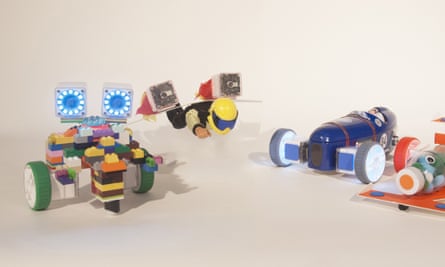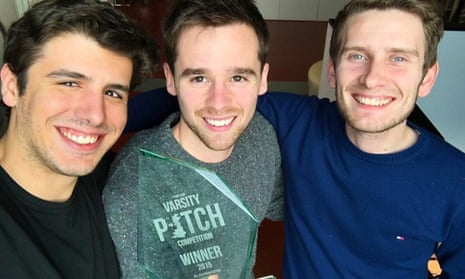Take a block of plastic, some magnetic wheels and a smartphone app, and what do you get? A moving sports car, a revolving fairground carousel or a launchable rocket, as inventor Peter Spence is happy to demonstrate.
Spence is co-founder of Tio, which makes a kit to build app-controlled toys. Together, the block, wheels, app, plus a mount, give motion, power and light to whichever object they are attached to. For example, attach the kit to a car made out of Lego, or a rocket made out of an empty plastic bottle, and they are transformed into app-controlled toys.
The idea was a result of Spence’s MA in Innovation Design Engineering from the Royal College of Art in London, and the business recently won the National Association of College and University Entrepreneurs (Nacue) Varsity Pitch competition. To enter, students and recent graduates submitted a video pitch for their business. Successful applicants made it through to a semi-final, bootcamp and then a final pitch, where 10 entrepreneurs gave a presentation to a panel of judges. The detailed brief for the competition encouraged the startup to refine its business plan. “It pushed us to answer things we hadn’t considered before,” says Spence.
Tio’s plan is to get young people enthused about engineering: “Our ultimate goal is to inspire tomorrow’s inventors,” says Spence. The products bring together tech and craft, and it is hoped they will be used in schools, encouraging children of any age to dabble in design and engineering as part of everyday play.
What makes the kit different to similar tech products is that it is fully wireless, says Spence. In other words the hardware components, the remote-controlled block and wheels, are independent from the app. And, as smartphone and tablet software develops, the kit can be used for more sophisticated inventions. “Once you have the initial blocks and accessories [from Tio], you can keep building toys over and over again,” says Spence.
His goal when starting at the RCA was to create a product that could be sold to the consumer market. After coming up with the idea for Tio he joined forces with his coursemate Ashley Wiltshire, who has a background in graphic design.
“Ashley and I immediately got on really well – we had opposing skills sets and ways of working but they kind of complimented each other.” Spence and Wiltshire graduated in the summer of 2014, and in January they registered the business and began working on it full-time.
The team are based at InnovationRCA [the Royal College of Art’s centre for enterprise and entrepreneurship], which has helped them get the business going and provides resources such as office space and coaching.

One of the lessons Spence learned while taking part in the Nacue competition was to highlight the potential social impact of their products – encouraging children to play inventively, and potentially to take up studies or careers in STEM [science, technology, engineering and maths]. If next year’s entrants asked him for advice, Spence would pass on the same tip. He says: “Make sure that you cover the product, the market, the social impact, and show understanding of the business principles. Prepare yourself for questions across the whole spectrum of what a startup business is.”As the winner of the contest, Tio received £10,000 and they are deciding how best to use it to grow their business. One of the judges Tio impressed was Andrew Webber, senior audience marketing lead at Microsoft UK, who is now a valuable contact for the startup. Spence says: “It’s early days, but we are evaluating the different opportunities with Microsoft.”
Spence believes that it’s a desire to create something that has a positive influence on the world that is driving more young people towards entrepreneurship. “Among graduates in the last few years, there’s a really positive vibe towards startups and doing your own thing. There’s a desire to create stuff that can actually make a difference.” The team plans to launch a campaign on Kickstarter early next year. They haven’t decided on a financial target yet, but they are keen to secure capital for large-scale manufacturing, to build awareness of their brand and to grow the number of orders for their kit. “We chose Kickstarter as I’ve personally been a follower since it started, so I’m very familiar with the platform, the way it works and the community behind it,” adds Spence.
Eleven months since launching, Tio has already secured substantial funding and high-profile contacts. Spence adds that the Tio kit is just the start of the co-founder’s business plan. “We see our current product as one of a whole family of products moving forward.”
Part of their success comes from the co-founders’ chemistry. Spence and Wiltshire were already an effective partnership and Mario Morello, the third member of the management team, added new talents and a focus on developing the business and its brand.
Spence concludes: “We have a consistent motivation to inspire tomorrow’s inventors – and we just enjoy working with each other.”
Sign up to become a member of the Guardian Small Business Network here for more advice, insight and best practice direct to your inbox.

Comments (…)
Sign in or create your Guardian account to join the discussion